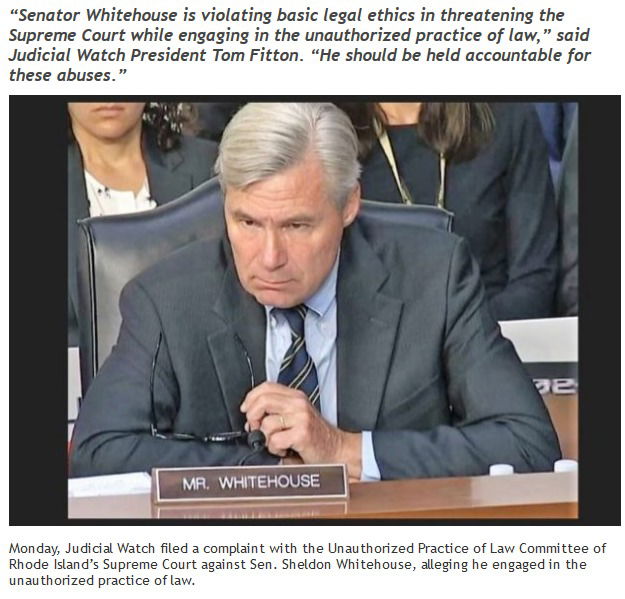Again more over reach by politicians
Aug 20th, 2019

The complaint alleges “Whitehouse filed a brief with U.S. Supreme Court on behalf of four clients while maintaining inactive status and that the brief was nothing more than an attack on the federal judiciary and an open threat to the U.S. Supreme Court.“
We previously wrote about that Whitehouse brief, Dem Senators to Supreme Court: Rule our way on 2nd Amendment case, or face possible restructuring.
In a letter to the chairman of the Unauthorized Practice of Law Committee, Judicial Watch wrote:
Judicial Watch files this unauthorized practice of law complaint against Rhode Island bar member U.S. Senator Sheldon Whitehouse for filing a brief with the U.S. Supreme Court on behalf of four clients while maintaining inactive status. In addition, the brief Senator Whitehouse filed was unbecoming of the legal profession as it is nothing more than an attack on the federal judiciary and an open threat to the U.S. Supreme Court.
According to the Rhode Island Judiciary website, Senator Whitehouse maintains inactive status. As an inactive member of the Rhode Island bar, Senator Whitehouse cannot practice law in Rhode Island. However, on August 12, 2019, Senator Whitehouse did just that. He filed an amicus curiae brief with the U.S. Supreme Court on behalf of Senators Mazie Hirono, Richard Blumenthal, Richard Durbin, and Kirsten Gillibrand. The filing of a brief – let alone all that is required to file a brief – on behalf of clients is indisputably the practice of law.
To be clear, Senator Whitehouse may not have spoken to his clients, researched the law, or written the brief in Rhode Island. However, he provided a Providence, Rhode Island address to the Rhode Island Judiciary. In addition, there is no dispute that Senator Whitehouse is a Rhode Island resident and spends a substantial amount of his time in Rhode Island. If Senator Whitehouse is practicing law in another jurisdiction, it is merely incidental or temporary. Under the rules, Senator Whitehouse was practicing law in Rhode Island.
In addition, to Judicial Watch’s knowledge, Senator Whitehouse is not authorized to practice law in another jurisdiction. Senator Whitehouse lists a Washington, D.C. address on the brief; yet, according to the District of Columbia Bar website, Senator Whitehouse is not a member of the DC Bar. Therefore, if Senator Whitehouse claims he was not practicing law in Rhode Island but in Washington, D.C., he violated the “Unauthorized Practice of Law” rule of D.C.
Besides practicing law without the proper authorization, Senator Whitehouse also violated the Rhode Island Rules of Professional Conduct by attacking the federal judiciary and openly threatening the U.S. Supreme Court. The brief concludes:
The Supreme Court is not well. And the people know it. Perhaps the Court can heal itself before the public demands it to be “restructured in order to reduce the influence of politics.” Particularly on the urgent issue of gun control, a nation desperately needs it to heal.
In other words, if the U.S. Supreme Court does not rule the way Senator Whitehouse and his clients prefer, they will use their power as Senators to restructure the Court.
Such a threat violates the spirit if not the letter of Rhode Island’s Rules of Professional Conduct. As the preamble explains:
- “A lawyer should use the law’s procedures only for legitimate purposes and not to harass or intimidate others.”
- “A lawyer should demonstrate respect for the legal system and for those who serve it, including judges.”
- “A lawyer should further the public’s understanding of and confidence in the rule of law and the justice system.”
- A lawyer should “maintain a professional, courteous and civil attitude toward all persons involved in the legal system.”
Attacking the federal judiciary and openly threatening the U.S. Supreme Court is unbecoming for a member of the legal profession as well as a sitting U.S. Senator. Senator Whitehouse’s assertion, without basis, that the Court does not rule on the merits of cases but rather on partisan beliefs undermines confidence in the legal system. It is one thing for a politician to make such a claim on the campaign trail, it is another for a lawyer to make such a charge as part of a legal proceeding. In doing so, Senator Whitehouse has violated the rules of professional conduct.
The misconduct of Senator Whitehouse noted above appears obvious on its face. Senator Whitehouse either violated Rhode Island’s or D.C.’s rules, or both. Senator Whitehouse’s filing of a brief on behalf of clients without an active law license anywhere in the country is inexcusable. Senator Whitehouse’s attack on the federal judiciary and open threat to the U.S. Supreme Court raises substantial questions about his character and fitness to practice law. His actions warrant a full investigation by the Unauthorized Practice of Law Committee.
Sen. Whitehouse gained national notoriety during the confirmation hearings for Justice Kavanaugh when he used his time to grill the judge over a fart joke in his high school year book.